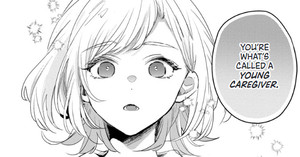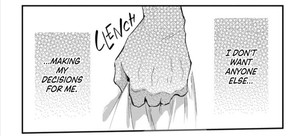The Spring 2025 Manga Guide
Snow Angel
What's It About?

Muku Shiroshika's happy and carefree childhood came to an abrupt end after her father's tragic death. In the ten years since, she's worked as a thankless caregiver for her dementia-suffering grandfather. Between taking care of her family, searching for a job, and enduring her grandmother's constant criticism, Muku finds herself drowning. She's desperate to escape, but with nowhere to go, Muku loses hope—that is, until her childhood friend Yuto appears on her doorstep one snowy day and inspires her to live for herself.
Long gone are the days when Muku Shiroshika would play carefree in the snow with her childhood friends. Thrust into a thankless caregiver role, Muku wants to break free from her oppressive family and regain control of her life. When her childhood friend Yuto pays her an unexpected visit, she finds hope in his words and decides to take a chance on happiness. But as she works to define herself, she finds that breaking free of her family's influence is harder than she thought.
Snow Angel has story and art by Haruka Chizu. English translation by Andria McKnight and lettering by Rebecca Sze. Published by Viz Media (May 13, 2025). Rated T.
Content warning: domestic abuse.
Is It Worth Reading?
Rebecca Silverman
Rating:

I feel protagonist Muku's situation in my bones. She's in an unenviable position, stuck with both Eldest Daughter Syndrome and being a caregiver for her grandfather, and trust me, that's not a good place to be. After her father's accidental death, Muku, her sister Inori, and their mother moved in with their grandparents, and not two years later, when Muku was thirteen, her grandmother made her the chief cook and bottlewasher for the family, putting household duties and caring for her grandfather on Muku. It's not uncommon – there's a name for the phenomenon for a reason – but it's also soul-crushing, and the burden of caring for someone can add to it exponentially.
Like most people in that situation, Muku doesn't fully recognize what's happening to her. She knows it's bad, but that's about it. The strongest parts of this volume are when creator Haruka Chizu draws Muku dissociating. Muku herself refers to it as “zoning out,” and she sees herself as slowly sinking under the water, with bubbles filled with her grandmother's hurtful words trying to get into her mouth and drown her. She's vaguely aware of what's being said to her, but she's isolated within her drowning tank, and Chizu makes each panel of dissociation feel claustrophobic and suffocating. Muku's life has been stolen from her, and she's starting to lack the will to even try to swim to the surface.
The reentry on scene of her childhood friends, brothers Sakuto and Yuto, could have been played as a knight-in-shining-armor moment. But instead of riding up to save her, instead Yuto and Sakuto offer her the tools to eventually save herself: they tell her that what she's going through is neither okay nor normal. That's more powerful than any extended hand or proffered sword; it's the means for Muku to understand what's happening to her and take her future into her own hands. The opening salvo does go a bit too quickly for good storytelling; the now-adult brothers show up, overhear an argument, and immediately take her to their house. But while I'll complain from a literary perspective, from an emotional one, I have to say that I have no real arguments. Reading more about Muku suffering in that house, being reprimanded for being a person with a brain and ambitions, would simply be too painful.
Caregiving is the hardest work I've ever done. Snow Angel understands the toll it can take, especially if you're not allowed to do or be anything else, and how the added burden of being the eldest daughter can compound everything. Watching Muku learn that she doesn't have to take the abuse and that she can be more than just “the good daughter” or “the caregiver” stands to be a cathartic experience, albeit a difficult one. I don't love Yuto as a character and presumable love interest thus far, but if you've ever been either the carer or the eldest child, there's a good chance this will speak to you.
MrAJCosplay
Rating:

Some stories are written in a way specifically to make the reader feel uncomfortable, and Snow Angel is exactly that. However, whether or not I can praise the story for its ability to make me feel uncomfortable is oftentimes a tricky line to ride. If you're creating an uncomfortable environment just for the sake of it, then I would call that lazy. If you're trying to tell a story that people would find relatably uncomfortable, then I think you have much more room to tell a captivating story.
I genuinely do not know which side of that line the Snow Angel falls on by the end of the volume. The beginning is so strong, establishing a very relatable lead in a very uncomfortable situation. It's not that her home life is terrible, but she is being gaslit and guilt-tripped by the maternal figures in her life to give up any sense of personal freedom for the family. I like how uncomfortably real this situation is because nothing immediately comes off as malicious. For a split second, you see where our lead's mom and grandma are coming from until slowly you also start to see their unwillingness to compromise for what they think is how things should traditionally go. I have legitimately met people who have had similar conversations with their parents. I wanted to see our lead break away from that environment or find a way to live her life in a way that perhaps made everybody happy.
We get to the second half of the volume where she is extensively “saved” by some childhood friends who try to put her up in a different living environment. This is fine, but the story seems to be establishing that the issue in the show is going to be our lead directly going at odds with their mother and grandmother. I'm concerned because I don't know what type of story this series wants to tell. There are so many other factors involved in this family situation, like our lead's grandfather, who is debilitated to the point where he needs somebody to help him go to the bathroom, and our lead's sister, who is still at a young and impressionable age. There's also a strongly implied romance between our lead and their childhood friend, so there are a lot of very real interpersonal relationships going on. I genuinely don't know how this story will juggle them all. I will continue reading to see if it works out or becomes a train wreck. I can still recommend it as long as you proceed with a similar level of caution.
discuss this in the forum (28 posts) |
back to The Spring 2025 Manga Guide
Seasonal homepage / archives